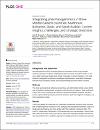| الملخص | Background and objectives Pharmacogenomics (PGx) leverages genomic information to tailor drug therapies, enhancing precision medicine. Despite global advancements, its implementation in Lebanon, Qatar, and Saudi Arabia faces unique challenges in clinical integration. This study aimed to investigate PGx attitudes, knowledge implementation, associated challenges, forecast future educational needs, and compare findings across the three countries. Methods This cross-sectional study utilized an anonymous, self-administered online survey distributed to healthcare professionals, academics, and clinicians in Lebanon, Qatar, and Saudi Arabia. The survey comprised 18 questions to assess participants' familiarity with PGx, current implementation practices, perceived obstacles, potential integration strategies, and future educational needs. Results The survey yielded 337 responses from healthcare professionals across the three countries. Data revealed significant variations in PGx familiarity and educational involvement. Qatar and Saudi Arabia participants were more familiar with PGx compared to Lebanon (83%, 75%, and 67%, respectively). Participation in PGx-related talks was most prevalent in Saudi Arabia (96%), followed by Qatar (53%) and Lebanon (35%). Key challenges identified included test cost and reimbursement, insufficient physician knowledge, and lack of infrastructure. Lebanon reported the highest concern for test costs (16%), compared to the lowest in Saudi Arabia (5%). Despite these challenges, a strong consensus emerged on PGx's potential to improve patient outcomes, with over 86% of respondents in all three countries expressing this belief. Educational interest areas varied by country, with strong interest in PGx for cancer chemotherapy in Saudi Arabia and Lebanon and for diabetes mellitus in Qatar. Conclusion This study highlights the significant influence of varied educational backgrounds and infrastructural limitations on PGx implementation across Lebanon, Qatar, and Saudi Arabia. The findings emphasize the need for targeted strategies in each country to address these distinct barriers. Integrating PGx education into healthcare training programs and clinical workflows could unlock PGx's potential to optimize patient care. |


